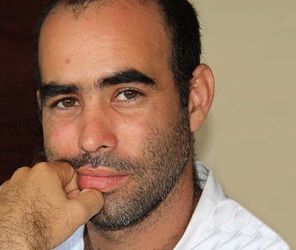LA FABRIQUE AT CANNES – Armando Capo, “August”
(part of a multi-article series about the 2014 Fabrique des Cinémas program at the Cannes Festival)
THE PITCH: In the summer of 1994, rafters are getting ready to try the impossible journey to America. Meanwhile, someone is watching them.
What is your brand of filmmaking, cinema that’s meant to entertain or cinema that will nourish someone’s moral and political convictions?
I live in a political country so everything from, eating, thinking to sex to the economy, absolutely everything passes through the filter of politics. So it is impossible that a film not be a part of this system.
To make a movie in Cuba means to be able to justify one’s own position, speech, and identity. I am interested in a cinema that is consistent with what I think, so that I can commit to the reality on the ground, I don’t want it to be complacent, easy, consumer-ready, painless, or tasteless.
Do you play a musical instrument?
I’m not musical performer, I cannot even dance a decent bolero, let alone play a instrument.
Screen Comment will be in Cannes covering the Festival during May 14-25. Follow us on Twitter @ScreenComment
OK, what’s on your playlist then?
Yesterday I was listening to music on my computer while trying on some clothing for the trip to France. I listened to the orchestra NG la Banda, some old Candyman rap stuff and el Medico de la Salsa, in particular a song that’s been stuck in my head for ever, Arriba de la bola (LISTEN HERE)
What is the function of art in your life?
I use it to heal, to get the demons who keep me from sleeping out of my head, to be a better person.
Why did you choose the summer of 1994 especially to tell your story?
I was fourteen in the summer of that year. I was spending my last days in the small town of Gibara, I was leaving soon to study in another town.
My house was near the sea, so when the rafters [ed- people who emigrate illegally in self-constructed and precarious vessels] began assembling I’d get closer so I could watch them. They met on the beach, people were swimming, it was like a strange party, almost like some kind of ritual to a pagan god.
I went to the beach every day and made friends with some people from the group of rafters, they were building a boat by modifying the engine of an old Moscovitch car.
Before leaving one of them gave me a letter to deliver to his family which happened to live in the same city I was moving to.
The holidays were coming to an end soon. There was a thunderstorm coming, I remembered.
By September I still had the letter with me. And after the novelty of arriving in a new place wore off I went out looking for the house. I went by it twice until I mustered the courage to knock on the door.
The lady was called Emilia. On the wall there was a diploma of someone who had studied the piano.
The husband did not talk to me and thought that I had come asking for water. I explained that I didn’t, and that I came from Gibara with an envelope that her husband’s friend had given to me.
He thanked me as I clutched the envelope and asked me to wait, as his son would be coming soon.
I did not want to lie. I felt a lump in my throat and was ill at ease.
I felt sad. “Do you feel bad?” the husband asked me as he went into the kitchen to get me water. I ran off before he returned so that he wouldn’t force the answer out of me, that his son had gone out at sea on a flimsy raft made of parts from a table, rubber and attached by cables, and that on the day of his departure a storm was coming.
I ran away and never came back. It still hurts.
That’s a tough story. I’m sorry to hear it. What stage is “August” in?
I’m working on the screenplay at the moment.
Can you describe your film in three brief sentences?
It is a film made for healing. Beyond any talk of Carlos and the summer of 94 it is about who we are and why we are. It’s a film that needs to be made.
news via inbox
Nulla turp dis cursus. Integer liberos euismod pretium faucibua



